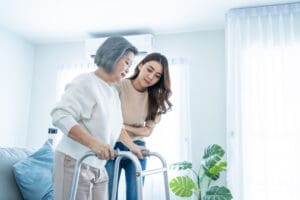Balancing personal commitments, work responsibilities, and family care can be a monumental challenge. As parents age, the need for consistent and attentive care increases, often causing stress for adult children who may not be able to be physically present at all times. In fact, as of 2014, over 17 million people in the U.S. are caring for a family member over the age of 65 who needs extra assistance in some way. Fortunately, advancements in smart home technology are providing effective solutions, making it easier for kids to enhance their parents’ safety and comfort remotely. Key technologies such as smart lighting systems, home theater and audio systems, automated window blinds, and surveillance systems play crucial roles in this modern caregiving approach. If your parents are reaching an age where they need more assistance throughout the day, here are some ways smart home technology makes life easier for aging individuals.
 Smart Lighting Systems: Enhancing Safety and Comfort
Smart Lighting Systems: Enhancing Safety and Comfort
Smart lighting systems offer more than just convenience; they significantly enhance safety and comfort for older people. These systems can be programmed to adjust lighting based on the time of day, ensuring that homes are well-lit during evening hours to prevent falls and other accidents. For example, motion sensors can activate lights when someone enters a room, reducing the risk of tripping in the dark.
Moreover, smart lighting can be controlled remotely via smartphone apps. This allows adult children to monitor and adjust lighting as needed. If a parent forgets to turn off lights, the system can automatically switch them off after a certain period, conserving energy and reducing costs. Additionally, the ability to create preset lighting scenes can help create a calming environment, contributing to a sense of well-being and reducing anxiety in elderly parents.
Home Theater and Audio Systems: Keeping Parents Entertained and Connected
Home theater and audio systems equipped with smart technology can provide entertainment and foster connections, which are vital for the mental health of aging parents. Smart TVs and speakers can be controlled remotely, allowing children to assist their parents in navigating streaming services, selecting programs, or even setting up video calls with family members.
These systems can be integrated with voice assistants, enabling parents to control their entertainment with simple voice commands. This ease of use particularly benefits those with mobility issues or cognitive decline. Furthermore, audio notifications can remind parents to take their medication, attend appointments, or perform other daily tasks, providing additional support.
Automated Window Blinds: Promoting Health and Convenience
Automated window blinds contribute significantly to the comfort and health of elderly parents. These blinds can be programmed to open and close at specific times, ensuring that parents get enough natural light during the day while maintaining privacy in the evening. Exposure to natural light is crucial for regulating sleep patterns and boosting mood, which is particularly important for aging individuals who might spend a lot of time indoors.
From a distance, children can control the blinds using smartphone apps, making adjustments as necessary based on weather conditions or their parents’ preferences. This technology also eliminates the physical strain of manually adjusting heavy or hard-to-reach blinds, reducing the risk of injury.
Surveillance Systems: Ensuring Safety and Peace of Mind
One of the most significant contributions of smart home technology is in the realm of security and surveillance. Modern surveillance systems include high-definition cameras, motion detectors, and doorbell cameras that stream live video to smartphones. These systems allow children to monitor their parents’ homes in real-time, ensuring their safety and providing peace of mind.
Surveillance systems can alert children to unusual activity, such as an unexpected visitor or a potential intruder. Additionally, many systems include two-way communication features, allowing immediate interaction with parents if necessary. This capability is particularly reassuring in emergencies, as children can quickly assess the situation and coordinate appropriate responses, such as contacting emergency services or a nearby neighbor.
Integrating Smart Home Systems: A Holistic Approach
The true power of smart home technology lies in the integration of various systems to create a cohesive, automated environment tailored to the needs of aging parents. At Accurate Electronic Interiors, we recommend the Savant smart home technology system for its proven track record of reliability and adaptability.
For example, a morning routine can be programmed to turn on lights gradually, open blinds, play gentle music, and provide a weather update—all triggered by a single voice command or scheduled time. Such integration enhances convenience and ensures that the home environment is optimized for safety, comfort, and well-being.
Learn More About How Smart Home Technology Makes Life Easier for Aging Individuals from Our Team at Accurate Electronic Interiors.
As our parents age, the responsibility of ensuring their safety and comfort can feel overwhelming, especially when we cannot be physically present. Smart home technology offers a practical and efficient solution, empowering children to care for their parents remotely. These innovations, from smart lighting systems and automated blinds to advanced surveillance and entertainment systems, create a safer, more comfortable, and connected living environment for older people. Embracing these technologies provides peace of mind for families and significantly enhances the quality of life for our aging loved ones. Visit Accurate Electronic Interiors today and learn how smart home technology makes life easier for aging individuals and how to get started on the road to achieving peace of mind as you care for your loved ones.

 Smart Lighting Systems: Enhancing Safety and Comfort
Smart Lighting Systems: Enhancing Safety and Comfort